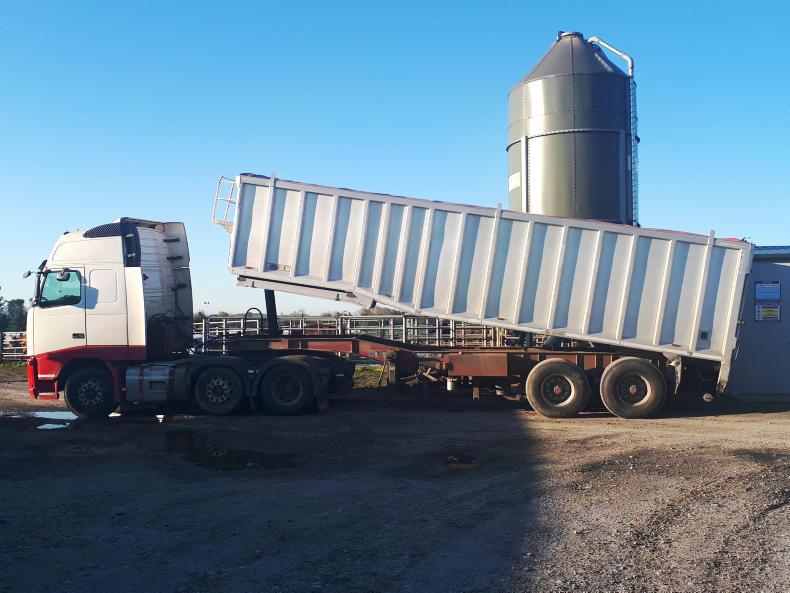The June milk cheque of €75,500 landed into the account in the last week. There was so much going out it’s good to get something come the other way. The cheque is for 200,000 litres supplied in June which is 17% behind the volume supplied in June 2017. This volume reduction is the carryover supply reduction from the March snow storms.
Year to date 2018 farm supply is actually making up ground on 2017 volumes supplied. In the April statement the farm was 27% behind in volumes supplied for year to date, 25% in May, and now supply is 23% under compared to the same time period in 2017 according to the June statement.
However, no two years are the same as farmers are only too well aware. The milk is coming at a significant extra cost this year as feed purchases due to the summer drought mean purchased feed costs are a good bit higher. The 16% protein Glanbia nut is coming in at a list price of €282 per tonne for 10 tonne loads delivered. Fed out at 6kg per cow per day for 329 cows that’s 2,000kg per day or 14 tonne per week required. The farm got a load of beet pulp nuts delivered this week and the diet now includes 2 to 3 kg of beet pulp per cow per day therefore allowing us reduce the Glanbia nuts to 6kg/cow/day from 8kg. There is maybe1 kg of grass in the diet now as the farm is bare and the balance is first cut pit silage. The cows are being fed out in paddocks. The plan is to move the herd around the farm to help keep cows cleaner for milking etc. As discussed last week a diet feeder is now hired and feeding out the pit silage and nuts in the field.
While about 5mm of rain fell on Friday in Kilkenny it will do little or nothing in the short term for creating feed for the milking cows. If we did get significant rain we still wouldn't be able to graze the cows for at least two weeks to give paddocks a chance to grow and allow the sour grass a chance to grow out. No nitrogen will be spread for the foreseeable future as it's moisture rather than nitrogen limiting growth on this farm. If the forecast is to be believed it’s showing little or no rain for next week either so the farm is looking at a situation of having to keep this diet in place probably up to mid August.
The last milk test (18 July) shows a result of about 19kg per cow at 3.76% protein and 4.66% fat (1.5kg MS/cow) at 284,000 cell count, 16 TBC and 4.85% lactose.
Read more
All-silage-and-meal diet beckons for Greenfield
The June milk cheque of €75,500 landed into the account in the last week. There was so much going out it’s good to get something come the other way. The cheque is for 200,000 litres supplied in June which is 17% behind the volume supplied in June 2017. This volume reduction is the carryover supply reduction from the March snow storms.
Year to date 2018 farm supply is actually making up ground on 2017 volumes supplied. In the April statement the farm was 27% behind in volumes supplied for year to date, 25% in May, and now supply is 23% under compared to the same time period in 2017 according to the June statement.
However, no two years are the same as farmers are only too well aware. The milk is coming at a significant extra cost this year as feed purchases due to the summer drought mean purchased feed costs are a good bit higher. The 16% protein Glanbia nut is coming in at a list price of €282 per tonne for 10 tonne loads delivered. Fed out at 6kg per cow per day for 329 cows that’s 2,000kg per day or 14 tonne per week required. The farm got a load of beet pulp nuts delivered this week and the diet now includes 2 to 3 kg of beet pulp per cow per day therefore allowing us reduce the Glanbia nuts to 6kg/cow/day from 8kg. There is maybe1 kg of grass in the diet now as the farm is bare and the balance is first cut pit silage. The cows are being fed out in paddocks. The plan is to move the herd around the farm to help keep cows cleaner for milking etc. As discussed last week a diet feeder is now hired and feeding out the pit silage and nuts in the field.
While about 5mm of rain fell on Friday in Kilkenny it will do little or nothing in the short term for creating feed for the milking cows. If we did get significant rain we still wouldn't be able to graze the cows for at least two weeks to give paddocks a chance to grow and allow the sour grass a chance to grow out. No nitrogen will be spread for the foreseeable future as it's moisture rather than nitrogen limiting growth on this farm. If the forecast is to be believed it’s showing little or no rain for next week either so the farm is looking at a situation of having to keep this diet in place probably up to mid August.
The last milk test (18 July) shows a result of about 19kg per cow at 3.76% protein and 4.66% fat (1.5kg MS/cow) at 284,000 cell count, 16 TBC and 4.85% lactose.
Read more
All-silage-and-meal diet beckons for Greenfield






 This is a subscriber-only article
This is a subscriber-only article










SHARING OPTIONS: